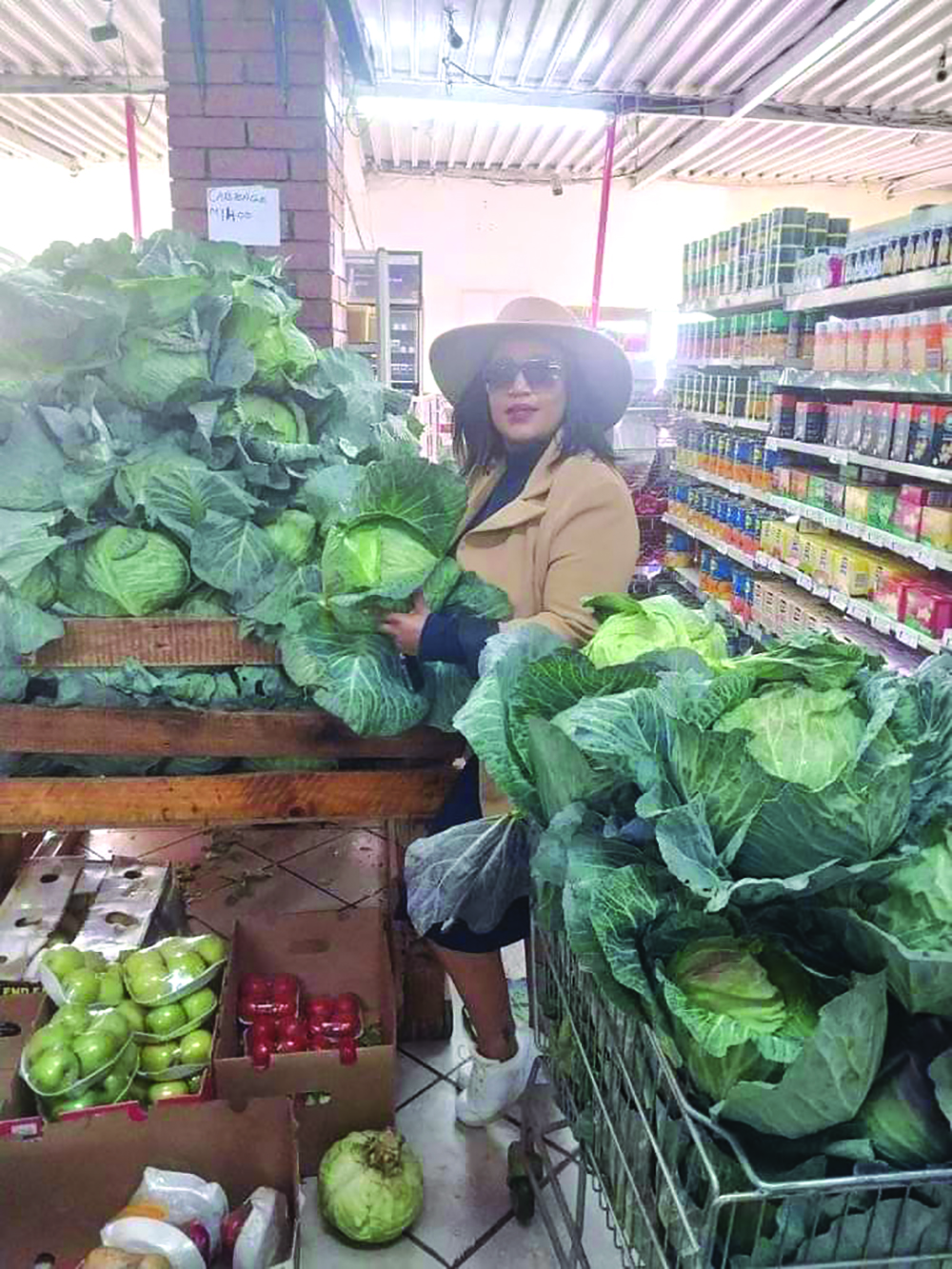By Kabelo Masoabi
In the fertile lands of Roma and Teyateyaneng, a tale of agricultural triumph unfolds, woven with dedication and resilience. Mateko Senchoba is a trailblazing farmer whose journey from banking to farming serves as a beacon of inspiration for agriculture enthusiasts and farmers alike. Amidst the challenges faced by women in agriculture in the least developing countries, Senchoba’s story stands out as a testament to the potential for breaking barriers and achieving greatness in the field. Armed with a degree in Business and Entrepreneurship, she defied convention and embraced the world of agriculture with fervour.
Seeding Ambition: A New Beginnin
Leaving her role as a branch manager at Nedbank in 2018, Senchoba embarked on a transformative journey, investing her savings into her agricultural aspirations. Her passion for farming she says was ignited through interactions with agribusiness professionals, propelling her towards a new career path filled with promise.
“I gained inspiration and wisdom from individuals who were mostly managing small and medium-sized businesses. By observing how they handled their projects, I became convinced that with patience, determination, and dedication, I too can accomplish great things. I also noticed a promising opportunity in the field of agribusiness, as it is a never-ending industry; people will always require food and farmers will always be in demand to produce and make food available,” she says.
Cultivating Success: From Chickens to Cabbages
Partnering with determination and daring the unknown, Senchoba established Tsoelopele Farm Fresh, a thriving vegetable enterprise spanning hectares of family-owned land. Despite grappling with challenges like water scarcity and climate change effects, she persevered, cultivating a profitable venture that flourishes amidst adversity. The farm’s main branch in Roma grows tomatoes and peppers in a shade net and tunnel system, while the other branch in Teyateyaneng, with four permanent employers, focuses on cabbage, beetroot, potato, and butternut production in an open field of 5 hectares.
“I began my journey with 100 chicks and a modest business plan of supplying chicken to street vendors after my observation that they are heavily dependent on imported chicken sold at local supermarkets. I successfully carved out a niche market for my produce and things were looking up,” she narrates.
Encouraged by her success, Senchoba expanded into egg production, however, she soon realised that the ever-increasing cost of feeding her stock was becoming a hindrance to her business.
“I had to make the difficult decision of suspending the entire poultry business,” she adds.
Despite setbacks such as the suspension of her poultry business due to rising costs, she remained undeterred, pivoting towards crop farming with unwavering determination.
Acknowledging the steep learning curve of transitioning from office to agricultural environments, Senchoba embraced education and networking, swiftly adapting to the demands of her new vocation. Despite facing a significant setback, she refused to give up on her dreams. She saw an opportunity in her family’s field and turned to crop farming to achieve her goals. She said she invested countless hours and resources into the venture, determined to make it a success. “The journey was not without its challenges, however. Water scarcity was a constant issue, and I had to explore innovative ways to irrigate the crops,” she points out noting high levels of theft in the area also posed a threat to her enterprise.
“I had to implement extensive security measures to protect the investment. Additionally, the impacts of climate change, such as unpredictable weather patterns and extreme heat, made it difficult to maintain consistent crop yields,” she explains.
Thriving Amidst Challenges: Innovation and Growth
She was quick to acknowledge that transitioning from working in an office to working in an agricultural environment pushed her to explore innovative approaches that would guarantee success.
“At first, all the crops were watered with water from the river, but we have made significant improvements since then. We have successfully installed a borehole irrigation system that has made the work much more manageable. “We have also constructed a greenhouse structure to protect plants from extreme weather conditions. This was after I learned about climate change mitigations,” she says, beaming with confidence for the progress she has made since 2018.
“The larger portion of land I plough is dedicated to cabbage production all year-round to ensure I have an all year money-spinner, but also to cement my presence as the desired and consistent cabbage producer in the land.”
Nurturing Excellence: Quality and Vision
The fresh produce is marketed directly to retail stores such as Shoprite, Pick n Pay, and other supermarkets owned by Basotho in Maseru. Senchoba says she sold 80% of 20,000 cabbage heads in the last season.
Implementing innovative solutions like borehole irrigation and greenhouse structures, she overcame obstacles with ingenuity and determination and is focusing on cabbage production as a lucrative staple. Senchoba’s commitment to quality sets her apart in the industry. Embracing best practices and market insights, she ensures her produce meets the highest standards, fostering customer satisfaction and loyalty.
While challenges like droughts test her resolve, she remains steadfast in her commitment to innovation and growth. With plans to expand her offerings to include a variety of vegetables, her vision extends beyond profits to promoting nutrition and wellness across Lesotho.
Fostering Community and Collaboration: A Call to Aspiring Farmers
She says, “To become a successful farmer, it’s important to focus on producing quality products that people will appreciate and support. One way to do this is by using quality hybrid seeds, fertilizers and pesticides. Keeping track of market trends and identifying the best-selling products and target markets.
“It’s also important to scale up production to increase profits, and to ensure customer satisfaction and loyalty; consistency is key. You can achieve this by always having at least one product that you can guarantee will be available in your farm. These are constructive steps that can help you thrive in the farming business.”
She continues to say, “It’s not all the time you will succeed because seasons are never the same. As we speak, I have lost 13 000 green and 8000 red cabbage heads due to the current drought. Nevertheless, I scored big on barbar butternut yield and we are gearing up to introducing chilis, green beans, carrots, and onions to our productions.
“Our goal is to have a business that supplies organic food all year round to promote good nutrition and fight illnesses. Every time a batch of veggies leaves the farm, I feel happy knowing that it’s going to feed people in Lesotho.”
To aspiring farmers, Senchoba offers sage advice: farming demands more than mere interest—it requires grit, hard work, and investment. “By fostering collaboration and continuous learning, I believe farmers can collectively elevate the industry and secure a brighter future for all,” she says.
Senchoba emphasises the importance of solidarity among farmers in producing quality goods and improving livelihoods. With her rallying cry to unite and create a better future, she embodies the spirit of perseverance and possibility that defines the agricultural community.
Summary
- Amidst the challenges faced by women in agriculture in the least developing countries, Senchoba’s story stands out as a testament to the potential for breaking barriers and achieving greatness in the field.
- The farm’s main branch in Roma grows tomatoes and peppers in a shade net and tunnel system, while the other branch in Teyateyaneng, with four permanent employers, focuses on cabbage, beetroot, potato, and butternut production in an open field of 5 hectares.
- Water scarcity was a constant issue, and I had to explore innovative ways to irrigate the crops,” she points out noting high levels of theft in the area also posed a threat to her enterprise.

Your Trusted Source for News and Insights in Lesotho!
At Newsday Media, we are passionate about delivering accurate, timely, and engaging news and multimedia content to our diverse audience. Founded with the vision of revolutionizing the media landscape in Lesotho, we have grown into a leading hybrid media company that blends traditional journalism with innovative digital platforms.






